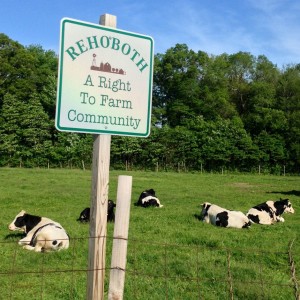Food Policy: If You Don’t Speak, Others Will Speak For You
 British Columbia’s former Minister of Agriculture, Corky Evans, spoke with attendees at 2016 North American Farmers’ Direct Marketing Association’s Convention about the political realities surrounding food policies.
British Columbia’s former Minister of Agriculture, Corky Evans, spoke with attendees at 2016 North American Farmers’ Direct Marketing Association’s Convention about the political realities surrounding food policies.
Evans spoke of his years of political service, including stints as Minister of Transportation and Minster of Health. But his primary focus was his experience as the Minister of Agriculture. That post most closely echoes his personal life — he is now retired from politics and is a full-time organic farmer.
He says elected officials and those that work for them want to pass laws that do good, by and large. The problem is that laws that affect farmers are crafted with lawyers, lobbyists and others who are not farmers themselves. The information and reports they’re given are often far removed from what’s happening on farms. So when laws are crafted and passed, they can do more to harm farmers than help. If farmers want their voices heard, they need to make sure politicians hear them.
Evans says he was about as high up as he could get in government when it came to food policy. But he had less of a voice than he expected, and that in many cases, the people affected by the law have a bigger voice for lawmakers than those who head up the government division.
Here are four tips from Evans to help you make a difference in local and national politics:
- Show up when any law that affects your farm is being discussed. Narratives about food policy take on a force of their own when there aren’t farmers there to show that any decisions made will have a real-world impact. Evans says galleries are filled with lobbyists, lawyers and others who had a voice during the crafting of laws, and lawmakers can feel insulated when those are the only people present. If farmers who will be affected by the laws are there to witness the debate, it shifts the tone of the conversation and makes lawmakers take the debate more seriously and can even change how he or she will vote.
- Do your best to have politicians visit your farm. We live in an urban society, Evans says. Most of the population lives in cities, and laws are often passed with an urban point-of-view, even when the laws affect rural communities. It’s common practice for lawmakers to complete the full business of a law from their offices, to rely on reports, and to never visit the areas that will be affected by the law. Evans says he had an epiphany at one point in his career. He told his staff he would not make a decision on any of the reports on his desk until he visited the locations the reports covered. He found that not one report was fully accurate. If you can invite those who have the power to affect how your run your farm, from local zoning board members to national members of Congress, it may change the tone of any future debate that will affect your business.
- Send hand-written letters rather than emails. Evans says hand-written letters have an out-sized impact when compared to emails. Emails are usually sorted through by the most junior person on the staff, often an intern who is still in college. Hand-written notes are routed through a more senior member of the staff, Evans says. Evans did not comment, however, about how political staff handle incoming mail in the U.S.
- Visit your officials. If you cannot get your politicians to come to you, take the time to visit them. Few barriers exist with visiting local officials — they’re close by and already know a great deal about the community. It’s more effort to visit provincial and state officials, and even more effort to head to Washington. But it’s the only way farmers will have their voice heard, Evans says. If you aren’t speaking for yourselves, someone else will speak for you.









